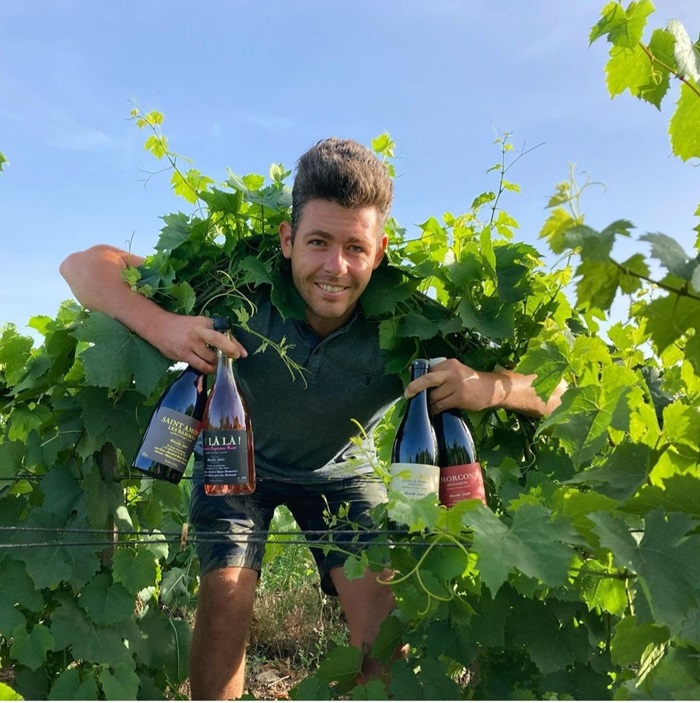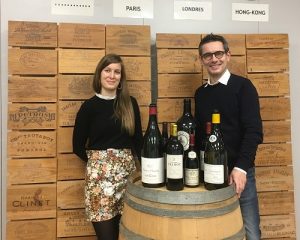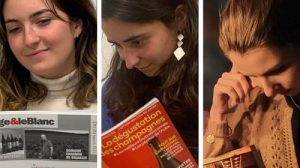
Born into a winemaking family with strong ecological and sustainable values, Yann Bertrand has embraced the biodynamic method and is now part of the new generation shaping the future of Beaujolais. Having visited the estate in 2020, we recently called Yann over the phone to find out more about his journey. Let’s head to the kingdom of Gamay!
The Bertrands, a family affair
The Bertrand family’s winemaking adventure began in the 1950s with Louis Bertrand, Yann’s grandfather. Based in Charentay, right in the heart of Beaujolais, Louis and his wife Renée built a name for themselves, supplying wines to renowned establishments in Lyon and Paris – most notably the prestigious Cave Legrand, a well-respected wine merchant in the capital. Yann never tires of mentioning that his great-grandfather – Louis’ father, that is – had an exceptional gift for wine tasting.

Back in 1972, while sampling a wine from the distinctive terroir of Fleurie, the latter foresaw its great potential and urged his son to invest in parcels in the region. Without further ado, Louis, Renée, and their son Guy (Yann’s father) took over the completely abandoned Château de Grand Pré estate in Fleurie. To finance this bold move, they sold all their plots of vines in Charentay. The historic château they bought, once a winegrowing and wine producing site, comprised a large, semi-underground vaulted cellar and a dedicated winemaking area. The arrival of the Bertrand family breathed new life into the estate, as they undertook a full renovation of both the château and vathouse. With this, a new chapter began for the 7.5-hectare estate.
In 1992, Guy Bertrand and his wife Annick took over the family wine business, continuing to develop and expand the estate. As new owners, the wine makers gradually acquired farmland surrounding the château, adding another 7.5 hectares to their estate. With this, the estate expanded to include two hectares in Morgon and 13 hectares in Fleurie. Pioneers in sustainable agriculture, Annick and Guy used neither weedkillers nor crop protection products. They established strong environmental values at the estate, adapting their methods to the unique needs of each parcel of vines. In 2005, the couple started experimenting producing wine without yeast, sulphur, or enriching. By 2008, the entire vineyard was officially certified organic
With Yann at the helm, the future is in safe hands
Just like his parents Annick and Guy, Yann also breathes a new lease of life into the estate. Born and raised among the vines, he is a true child of Beaujolais. He refers to himself as a ‘son of a winemaker’, just like his friends from the Lapierre and Metrat families. Despite his deep-rooted connection to wine, Yann initially followed a different path, earning a BTS in commerce and a professional degree in banking and insurance, far removed from his parents’ business. While working seasonal jobs in natural wine bars, he discovered a passion for a different style of wine than those produced by his family. This revelation led him to change course entirely, enrolling at the Beaune wine school where he met Julien Guillot, the current winemaker at Domaine des Vignes du Maynes. It was the latter who introduced him to the principles of biodynamics – an approach that would shape his own philosophy as a winemaker.

The Beaujolais native returned to his roots at Domaine de Grand Pré, where he embarked on a decade-long study of his terroir. Determined to understand every nuance of his terroir, Yann acquired a deep agricultural awareness that will later shape his approach – one that values the soil, the vines, and their delicate balance. In 2012, he crossed paths with Pierre Masson, one of the great pioneers of biodynamics. Inspired by his philosophy, Yann was encouraged to fully commit to the family estate and its future. That same year, the estate was divided between Yann and his cousin, Romain Zordan, a fellow winemaker. Each took charge of 7.5 hectares, cultivating their vines with distinct but equally passionate visions.
Tending the vines
At Domaine de Grand Pré, every decision is guided by the intuition, emotion, and a deep sensitivity to the land of the Bertrand family members. Each vine has its own identity, and every year tells a unique story. From pruning to bottling, the Bertrands’ goal is to express these values through ‘gentle’ techniques. When Yann took over, he fully embraced biodynamic farming, working in harmony with the fruit and the soil. His passion for nature drives him to experiment constantly, seeking to understand the true impact of practices on the vines. In 2015, after a particularly warm year, Yann decided to introduce composting into his vineyard, which also provided an opportunity to redevelop the microbial life of the soil in his vines. Despite the sandy soil (97% of which resulting from the erosion of Chiroubles rocks), it has been a success. Yann has since increased the organic matter used in his parcels from 0.9% to 3.3%. Following this challenging year along with two years of severe hailstorms, Yann launched a wine trading business to supplement his estate’s production. Yann naturally places great importance on the quality of his grapes and the philosophy of his suppliers, ensuring that everything aligns with his vision.

At Domaine de Grand Pré, pruning is done with precision and respect for the natural flow of sap. The vines are trained in the traditional gobelet style (forming four arms around a central base to distribute and aerate the clusters), with planting densities reaching up to 11,000 vines per hectare. Treatments include the use of plant extracts and essential oils to protect the vines. The estate’s yields vary depending on the year, typically ranging between 30 and 40 hectolitres per hectare. In particularly difficult years like 2015, production dropped as low as 19 hl/ha. In a move to refine his winemaking process and create more space between his wines and his cousin’s – who follows a different approach – Yann acquired a vatting-cellar space in Villié-Morgon where the grapes are taken after being harvested by hand. Today, this talented native of Fleurie cultivates 1.25 hectares in Morgon, 1.70 hectares in Beaujolais, and 6.05 hectares in Fleurie. He is supported by a small but dedicated team, including Roger – a tireless winegrower who has worked with all three generations of the Bertrand family.
Yann Bertrand, an icon of the future
An advocate for the AOP/AOC system, Yann has voiced his frustration over the request made by the appellation regarding premier crus. In his view, this move contradicts the region’s deep-rooted winemaking heritage. Passionate about his heritage, the young winemaker encourages the production of Beaujolais Nouveau. Yann produces some in good years, applying the same natural methods and meticulous care to these wines as he does to the rest of his production.
Looking ahead, Yann is exploring the use of green fertilisers to enrich the soil density in his vineyard. He also plans to plant fruit trees between his parcels, to foster greater biodiversity. Each vintage is approached with the same dedication and commitment to producing wines of remarkable depth and balance.
Who said ‘Beaujo’ doesn’t age well?
For those who still believe that Beaujolais can only be drunk young, Yann Bertrand would beg to differ. He suggests complex, meticulously crafted Beaujolais wines can offer an ageing potential of up to 20 years. “Not long ago, we tasted some 1988, 1989, 1991, and 1994 vintages from Maison Lapierre and Thevenet, it was absolutely fantastic! […] Of course, Beaujolais wines evolve over time. In fact, I recently bought a 2020 Morgon by Jean Foillard which is going to be perfect in 20 years.”
As you’ve gathered, Yann Bertrand remains deeply committed to the family values passed down through generations. He champions environmentally respectful practices and continues to refine his approach to natural winemaking, free from inputs. The young winemaker successfully navigated a path paved with obstacles on his way to undoubtedly becoming the future of Beaujolais. His 2022 vintage is naturally available on iDealwine.
Not only is his Beaujolais beautiful, its organic too.



